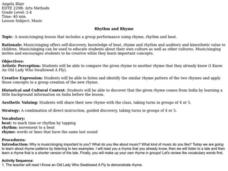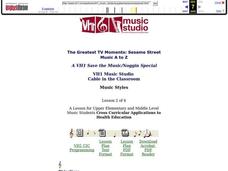Curated OER
El Joki Poki (The Hokey Pokey)
First graders sing and dance the Hokey Pokey bilingually. They read and sing the Spanish words for prepositions and act them out as they sing and act out the motions to the song, "El Joki Poki" (The Hokey Pokey).
Curated OER
Romantic and 20th Century Period Music
Upper graders explore the similarities, differences, and depth of pop music from the Romantic era and the 20th century. They listen to selections that exemplify the Baroque, Romantic, and 20th century periods, then create presentations...
Curated OER
I Am Special and You Are Special Too #4
The students listen to a book about being different and investigate that everyone is different, but special in their own unique way. The students draw a picture of themselves using multi-cultural markers. Along with the drawing, the...
National Museum of the American Indian
The Kwakwaka'Wakw: A Study of a North Pacific Coast People and the Potlatch
Discover the cultural practices and unique value systems of a group of native peoples from Canada called the Kwakwaka'wakw. Your young historians will discuss how conceptions of wealth can vary and how these native people utilized...
Curated OER
This Land is Your Land - Travel Posters
Eleventh graders compile a list of places in the United States where they have either traveled or where their relatives or friends live. They collect travel posters, brochures, postcards, and maps from their region of the United States.
Curated OER
Rhythm and Rhyme
Young scholars compare the given rhyme to another rhyme that they already know (I Know An Old Lady Who Swallowed A Fly). Students listen and identify the similar rhyme pattern of the two rhymes and apply those concepts to a group...
Curated OER
Rhythm and Rhyme
Learners listen to and identify the similar rhyme pattern of two rhymes and apply those concepts to a group creation of a new rhyme. They discover that the given rhyme comes from India by learning a little background information on India.
Curated OER
Cable in the Classroom
Students understand how to successfully work in a group. Students create and perform their own autobiographical rap songs. Students conclude how rap music and music in general can help us to deal with emotional issues.
Curated OER
Storytellers: Bruce Springsteen
Students use the music of Bruce Springsteen to learn literature techniques.
Curated OER
Music Styles
Pupils watch a video showing Sesame Street's featured musical guest stars and discuss what kind of moods and emotions are elicited in the songs. They discuss what songs evoke different emotions in their life.
Curated OER
Say It Loud!: A Celebration Of Black Music In America Music In America
Learners study early New Orleans Jazz music and recognize Louis Armstrong as an early jazz artist. They recognize the elements and roots of Jazz.
Curated OER
Haydn's Surprise
Students listen to Haydn's "Surprise" and use the score to create themes and variations with other rhythms. They create poems using Haydn's rhythm in the symphony and research his life. They also use "body percussion" to play parts of...
Curated OER
Say It Loud!: A Celebration Of Black Music In America - Gospel Beginnings
Young scholars identify musical characteristics of gospel and sing a gospel selection. They practice the call and response technique. After going through individual parts, they sing the entire song with piano accompaniment.
Curated OER
LOOKING DEEPER
Students study trauma, recognize episodes that can produce it, and behaviors it can elicit. They glean an example of a potentially traumatic event. They need to think who might be traumatized and why.















